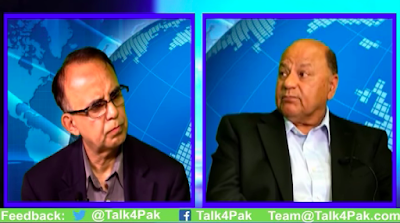PakAlumni Worldwide: The Global Social Network
The Global Social Network
Democracy in Pakistan: Headlines vs Trend-lines
With the country's parliament completing its second term since 2008, is Pakistan truly on the road to democracy? How do the headlines compare with the trend-lines? Are there any significant potholes in this road to democracy? Are the persistent negative headlines justified? Do oft-repeated dire forecasts about Pakistani state's survivability make sense?
Do Pakistani political party leaders practice democracy within their own parties? What accounts for attempts by the political party leaders and candidates to resist full financial and other disclosures? Why did they try to escape accountability by passing Election Act 2017?
Who are the "electables"? Why are political parties trying to recruit them to run as their candidates in the coming general elections scheduled for July 25, 2018? Can such "electables" bring about much needed reforms in the political parties? What are the downsides of putting up electables in terms of widening political participation and voter turnout?
Viewpoint From Overseas host Misbah Azam discusses these questions with Sabahat Ashraf and Riaz Haq (www.riazhaq.com)
Related Links:
US DoD 1999 Forecast: "Pakistan Disappears By 2015"
Democracy's Disappointing Report Card
Nawaz Sharif's Report Card 2013-18
CPEC Transforming Pakistan's Least Developed Regions
Pakistan: The Other 99% of the Pakistan Story
How Pakistan's Corrupt Elite Siphon Off Public Funds
Bumper Crops and Soaring Credit Drive Tractor Sales
How West Enables Corruption in Developing Countries
-
Comment by Riaz Haq on April 5, 2021 at 12:46pm
-
Negative Bias in #US #media: When #COVID19 cases rose, the news coverage emphasized the increase. When cases fell, the coverage instead focused on those places where cases were rising. When #vaccines showed positive results, the coverage downplayed it. https://www.nytimes.com/2021/03/24/briefing/boulder-shooting-george...
The researchers say they are not sure what explains their findings, but they do have a leading contender: The U.S. media is giving the audience what it wants.
-------------------
Bruce Sacerdote, an economics professor at Dartmouth College, noticed something last year about the Covid-19 television coverage that he was watching on CNN and PBS. It almost always seemed negative, regardless of what was he seeing in the data or hearing from scientists he knew.
When Covid cases were rising in the U.S., the news coverage emphasized the increase. When cases were falling, the coverage instead focused on those places where cases were rising. And when vaccine research began showing positive results, the coverage downplayed it, as far as Sacerdote could tell.
But he was not sure whether his perception was correct. To check, he began working with two other researchers, building a database of Covid coverage from every major network, CNN, Fox News, Politico, The New York Times and hundreds of other sources, in the U.S. and overseas. The researchers then analyzed it with a social-science technique that classifies language as positive, neutral or negative.
The results showed that Sacerdote’s instinct had been right — and not just because the pandemic has been mostly a grim story.
The U.S. media is an outlier
The coverage by U.S. publications with a national audience has been much more negative than coverage by any other source that the researchers analyzed, including scientific journals, major international publications and regional U.S. media. “The most well-read U.S. media are outliers in terms of their negativity,” Molly Cook, a co-author of the study, told me.
About 87 percent of Covid coverage in national U.S. media last year was negative. The share was 51 percent in international media, 53 percent in U.S. regional media and 64 percent in scientific journals.
Notably, the coverage was negative in both U.S. media outlets with liberal audiences (like MSNBC) and those with conservative audiences (like Fox News).
Sacerdote is careful to emphasize that he does not think journalists usually report falsehoods. The issue is which facts they emphasize. Still, the new study — which the National Bureau of Economic Research has published as a working paper, titled, “Why is all Covid-19 news bad news?” — calls for some self-reflection from those of us in the media.
Comment
Twitter Feed
Live Traffic Feed
Sponsored Links
South Asia Investor Review
Investor Information Blog
Haq's Musings
Riaz Haq's Current Affairs Blog
Please Bookmark This Page!
Blog Posts
US Immigrant Visa Freeze For 75 Countries: Why Pakistan But Not India?
The US State Department has suspended processing of immigrant visas from 75 countries, including Pakistan but not India. This action followed President Donald Trump's social media post that listed, without context, the percentage of immigrant households from these countries that rely on the US government financial assistance. While Mr. Trump’s post singled out immigrants,…
ContinuePosted by Riaz Haq on January 17, 2026 at 5:30pm
Indian NSA Doval Urges Young Hindus to Take Revenge on Muslims
In a recent speech to young Hindus in New Delhi, the Indian National Security Advisor Ajit Doval urged his audience to "avenge history". He talked about the looting and destruction of Hindu temples and many centuries humiliation suffered by Indians. Though he did not…
ContinuePosted by Riaz Haq on January 14, 2026 at 2:00pm — 3 Comments
© 2026 Created by Riaz Haq.
Powered by
![]()

You need to be a member of PakAlumni Worldwide: The Global Social Network to add comments!
Join PakAlumni Worldwide: The Global Social Network